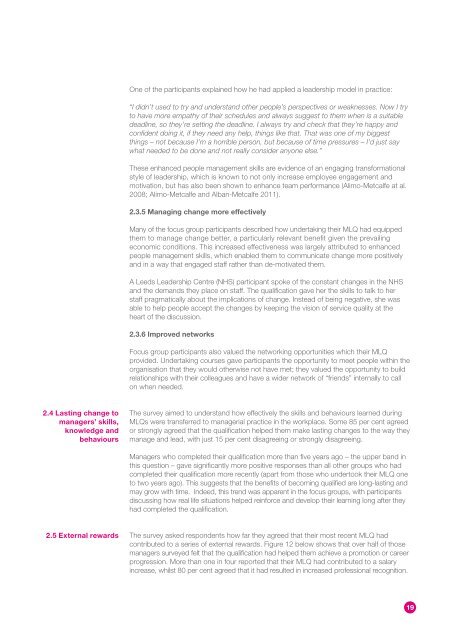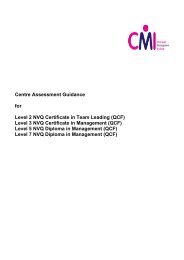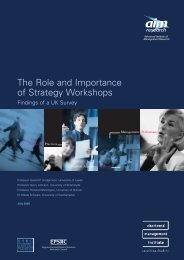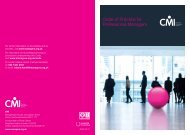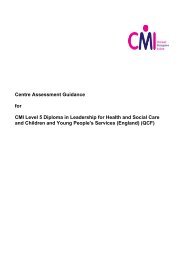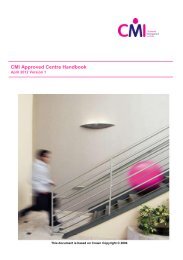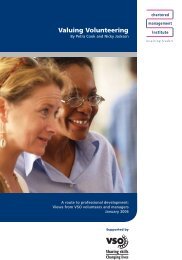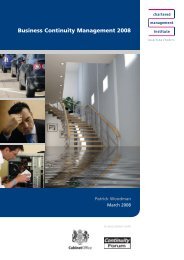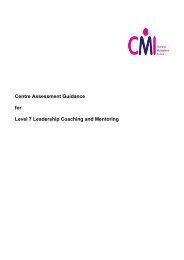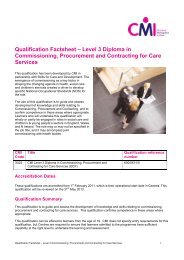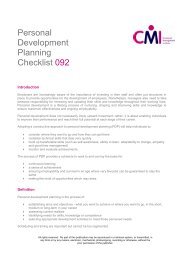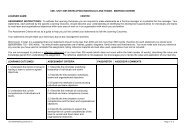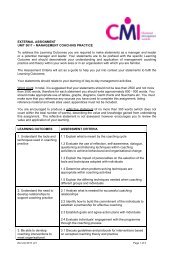The Value of Management and Leadership Qualifications
The Value of Management and Leadership Qualifications
The Value of Management and Leadership Qualifications
You also want an ePaper? Increase the reach of your titles
YUMPU automatically turns print PDFs into web optimized ePapers that Google loves.
One <strong>of</strong> the participants explained how he had applied a leadership model in practice:“I didn’t used to try <strong>and</strong> underst<strong>and</strong> other people’s perspectives or weaknesses. Now I tryto have more empathy <strong>of</strong> their schedules <strong>and</strong> always suggest to them when is a suitabledeadline, so they’re setting the deadline. I always try <strong>and</strong> check that they’re happy <strong>and</strong>confident doing it, if they need any help, things like that. That was one <strong>of</strong> my biggestthings – not because I’m a horrible person, but because <strong>of</strong> time pressures – I’d just saywhat needed to be done <strong>and</strong> not really consider anyone else.”<strong>The</strong>se enhanced people management skills are evidence <strong>of</strong> an engaging transformationalstyle <strong>of</strong> leadership, which is known to not only increase employee engagement <strong>and</strong>motivation, but has also been shown to enhance team performance (Alimo-Metcalfe at al.2008; Alimo-Metcalfe <strong>and</strong> Alban-Metcalfe 2011).2.3.5 Managing change more effectivelyMany <strong>of</strong> the focus group participants described how undertaking their MLQ had equippedthem to manage change better, a particularly relevant benefit given the prevailingeconomic conditions. This increased effectiveness was largely attributed to enhancedpeople management skills, which enabled them to communicate change more positively<strong>and</strong> in a way that engaged staff rather than de-motivated them.A Leeds <strong>Leadership</strong> Centre (NHS) participant spoke <strong>of</strong> the constant changes in the NHS<strong>and</strong> the dem<strong>and</strong>s they place on staff. <strong>The</strong> qualification gave her the skills to talk to herstaff pragmatically about the implications <strong>of</strong> change. Instead <strong>of</strong> being negative, she wasable to help people accept the changes by keeping the vision <strong>of</strong> service quality at theheart <strong>of</strong> the discussion.2.3.6 Improved networksFocus group participants also valued the networking opportunities which their MLQprovided. Undertaking courses gave participants the opportunity to meet people within theorganisation that they would otherwise not have met; they valued the opportunity to buildrelationships with their colleagues <strong>and</strong> have a wider network <strong>of</strong> “friends” internally to callon when needed.2.4 Lasting change tomanagers’ skills,knowledge <strong>and</strong>behaviours<strong>The</strong> survey aimed to underst<strong>and</strong> how effectively the skills <strong>and</strong> behaviours learned duringMLQs were transferred to managerial practice in the workplace. Some 85 per cent agreedor strongly agreed that the qualification helped them make lasting changes to the way theymanage <strong>and</strong> lead, with just 15 per cent disagreeing or strongly disagreeing.Managers who completed their qualification more than five years ago – the upper b<strong>and</strong> inthis question – gave significantly more positive responses than all other groups who hadcompleted their qualification more recently (apart from those who undertook their MLQ oneto two years ago). This suggests that the benefits <strong>of</strong> becoming qualified are long-lasting <strong>and</strong>may grow with time. Indeed, this trend was apparent in the focus groups, with participantsdiscussing how real life situations helped reinforce <strong>and</strong> develop their learning long after theyhad completed the qualification.2.5 External rewards<strong>The</strong> survey asked respondents how far they agreed that their most recent MLQ hadcontributed to a series <strong>of</strong> external rewards. Figure 12 below shows that over half <strong>of</strong> thosemanagers surveyed felt that the qualification had helped them achieve a promotion or careerprogression. More than one in four reported that their MLQ had contributed to a salaryincrease, whilst 80 per cent agreed that it had resulted in increased pr<strong>of</strong>essional recognition.19


